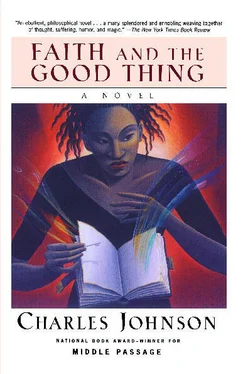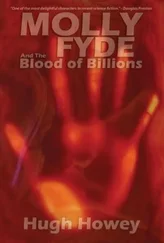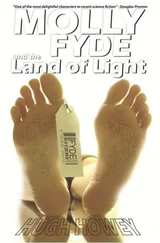“See, I don’t call myself an artist,” Jones said, slapping his chest. “That’s a special word. A real artist doesn’t play with colors like I do. He doesn’t have to. It’s as crazy as a coon dog with the tics, but it’s true: a real artist is his own canvas. Me — I still need that empty surface. I ain’t ready yet. But someday, when I’ve got hit all together, there won’t be a dime’s worth of difference between what I’m creatin’ and myself — you won’t be able to separate me from my work by space, or by a difference in materials, because — and I know it sounds crazy — my life’ll be the finished work. ”
Jones rubbed his nose, unconsciously smearing paint along his lips and, equally unaware, licking at it. Faith smiled to herself. He’d probably done that often — taken paint unconsciously on his tongue during the intoxication of creation, swallowed it, and sent it streaming through his system. He was that close to this thing.
“About the only real artist I ever knew was the Swamp Woman,” Jones said. “She didn’t need no paints, or stone, or sheet music, and I swear I believe she could change herself into any damn thing she pleased. No paints, just ideas. That’s what you work on the world with, right? But the trick’s in not comparin’ the ideas to the world to see if they’re right. She compared them to other ideas.” Jones, cleaning his brushes, sighed. “The world’ll never challenge your ideas — only other ideas can do that. ”
Without knowing why, Faith was alarmed. Something in her rebelled against this. She gave it voice. “If you don’t compare what you know, or think you know about the world to it, then how can you ever know if what you think is true?”
Jones blinked stupidly, trying to unravel her question. “I don’t—”
“You have to have something to compare things by, don’t you? The Good Thing — isn’t that the standard?”
He laughed. It did not sound wholly sane.
“There ain’t no standard.”
Faith said no more of this. Like so many ideas she’d been exposed to, she tucked this one away deep in her memory, refusing to dwell on it now and reserving it for those hours when she was alone, aching with wonder, and could inspect it like the contents of a lost purse one finds on the street.
Jones changed the subject. “What’re you going to tell your husband?”
“Isaac?”
“You’ve got more than one?”
Faith wrung her fingers. “What can I do?” The question seemed to pain him as much as it did her. He lit another cigarette, then pulled on his coat. Without speaking for a long time, he walked Faith back to the subway, then stood, his hands in his pockets, beside her on the empty platform.
“Alpha,” she said, “what do I do?”
He shrugged his shoulders. “Be thankful that we had a good time — you can’t ask for more than that.” And he kissed her on both eyes as her El train roared up behind them.
Children, sweet Faith rode that subway train for hours, back and forth, from the West Side to the North Shore. Finally, to avoid going to the apartment, she walked around the block several times, paced the street, and looked up the sixteen stories to the lighted front windows where she knew Maxwell sat at his desk, working. Waiting. At the corner, she stopped in a bar, had three Bloody Marys for courage, then headed, coiled up inside, for home. The words were framed and well edited in her mind. “Isaac, this is all wrong! We’ve been lying to each other for too long. I’ve lost something, and I’ve got to get it back. I haven’t been fair with you, but I want to settle all that now. You can have everything: the money, the furniture, every thing, but just let me go free.” As she stepped from the elevator to her floor Faith thought of Jones and added more to her confession. “Every life should be a kind of painting. We don’t have that together. We keep slashing the canvas with lies and—”
“Honey, come in here!” She heard him the instant she’d thrown open the door. She entered the front room, her head erect, and found him hunched over his desk, papers scattered over its surface beside empty coffee cups and an ashtray overflowing with ashes and half-smoked cigarettes. His collar was open and stained black along its length with perspiration; both his eyes were red and pinched against the light in the room. Faith sensed her confession slipping from her. It wasn’t going to be easy. Maxwell, despite his faults, despite the deadly chemistry destroying them, could —if she denied herself everything she valued — be loved. She admitted it: I love some thing about him. But not Maxwell himself. It was some general, vague thing about him that she knew she could love — the same thing she could love in a tree or a rock. Simply, that it was. But even that, no doubt, would be destroyed in the divorce courts. They might like, even slightly love each other when they went in, but the lawyers, to make a case, would have her and Maxwell at each other’s throats. They would part in hatred. It wasn’t right.
“They loved my first column on Jones,” Maxwell said. Though tired, he was ebullient.
“They did?”
“Ragsdale said Jones brought a kind of ‘understanding’ to the prison issue. Don’t look at me! I just wrote down what your home boy said. The editors especially liked the stuff he said about being free in prison — spirit transcending confinement, and all that — like Boethius, Lowell said, whoever that is.” Maxwell beamed. “They’re going to run it next week, and feature it in all The Sentry’ s sister papers.”
Faith tried to remember the opening lines of her confession. “Isaac—”
“Sssshl” he said, his left forefinger to his lips. He got up and went to the front closet, flung open its door, and let Faith look in. Side by side on the rack hung an ebony Persian lamb coat with mink trimmings and an ermine evening cloak.
She caught her breath. Maxwell grabbed her hand and led her through the front door, down the quiet hallway, and to the freight elevator. Inside, as they descended, she regained her composure. “Where are we going?”
Maxwell chuckled, then handed her a set of silver car keys. Faith’s hand shook as she looked at them. “These aren’t ours.”
“They’re yours,” he said. Downstairs in the parking lot beneath the apartment, he directed her to a sportscar so new there was hardly dirt on its tires. She knew little of these matters but sensed it was a foreign car, one of a limited line, and expensive. She felt her excitement building. And fought it. A car was merely metal, its chassis designed to cover as pleasingly as possible the ugly instruments, oil, and tubing inside. But the chassis was beautiful — long and sleek and silver like a newly polished bullet. The doors were cleverly concealed to give its surface the effect of uninterrupted steel, or an imporous surface like the robe of Christ, of power hidden beneath the hood.
“I got it all on credit, but the money’s finally coming in,” Maxwell said, “and I figure that it was mainly you, and what you did for me with Lowell, that turned the trick. He was raving about Jones’s column all morning long, and I know it’s not that good!”
She was in a dream — a maple tree still slumbering through a nightmare that would evaporate at dawn.
“Don’t you like it?” Maxwell asked. He sounded hurt; he waited nervously, his hands on his hams.
“Its’ beautiful. ” Faith said.
“I knew you’d like it,” he said. “It cost an easy ten grand, but that’s just the beginning! I’ve been checking on houses out in the suburbs. There’s a ranch house in Evanston, right near the lake. You’ll love it.”
Читать дальше












